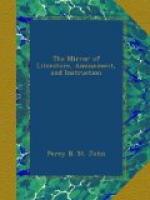VI., but has made the poor armourer confess his
treasons in his dying moments; for in the time in
which this custom prevailed, it never was even suspected
but that guilt must have been the portion of the vanquished.
When people of rank fought with sword and lance, plebeian
combatants were only allowed a pole, armed with a
heavy sand-bag, with which they were to decide their
guilt or innocence. In Smithfield were also held
our autos-de-fee; but to the credit of our English
monarchs, none were ever known to attend the ceremony.
Even Philip II. of Spain never honoured any, of the
many which were celebrated by permission of his gentle
queen, with his presence, notwithstanding he could
behold the roasting of his own subjects with infinite
self-applause and sang-froid. The stone
marks the spot, in this area, on which those cruel
exhibitions were executed. Here our martyr Latimer
preached patience to friar Forest, agonizing
under the torture of a slow fire, for denying the
king’s supremacy; and to this place our martyr
Cranmer compelled the amiable Edward,
by forcing his reluctant hand to the warrant, to send
Joan Bocher, a silly woman, to the stake.
Yet Latimer never thought of his own conduct
in his last moments; nor did Cranmer thrust
his hand into the fire for a real crime, but for one
which was venial, through the frailty of human nature.
Our gracious Elizabeth could likewise burn people
for religion. Two Dutchmen, Anabaptists, suffered
in this place in 1675, and died, as Holinshed sagely
remarks, with “roring and crieing.”
But let me say, (says Pennant,) that this was the
only instance we have of her exerting the blessed prerogative
of the writ De Haeretico comburendo. Her
highness preferred the halter; her sullen sister faggot
and fire. Not that we will deny but Elizabeth
made a very free use of the terrible act of her 27th
year. One hundred and sixty-eight suffered in
her reign, at London, York, in Lancashire, and several
other parts of the kingdom, convicted of being priests,
of harbouring priests, or of becoming converts.
But still there is a balance of 109 against us in
the article persecution, and that by the agonizing
death of fire; for the smallest number estimated to
have suffered under the savage Mary, amounts, in her
short reign, to 277. The last person who suffered
at the stake in England was Bartholomew Logatt, who
was burnt here in 1611, as a blasphemous heretic,
according to the sentence pronounced by John King,
bishop of London. The bishop consigned him to
the secular of our monarch James, who took care to
give the sentence full effect. This place, as
well as Tybourn, was called The Elms, and used
for the execution of malefactors even before the year
1219. In the year 1530, there was a most severe
and singular punishment inflicted here on one John
Roose, a cook, who had poisoned 17 persons of the Bishop
of Rochester’s family, two of whom died, and




